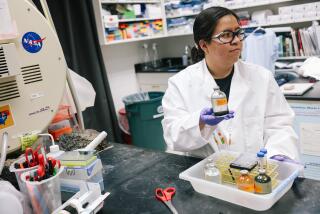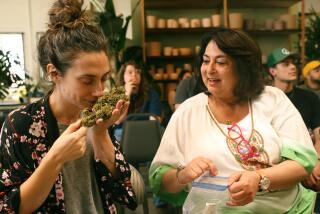Space Pods : Botany Students Grow Tomatoes From Seeds Used in NASA Project
- Share via
Using a scalpel, Santa Monica College botany teacher Kent Hodson opened gold-foil packets labeled “NASA” and painstakingly scraped 66 tomato seeds onto white index cards.
The seeds appeared to be normal. But they weren’t.
They were among 12.5 million seeds that orbited the Earth for six years in a satellite that was retrieved by the space shuttle Columbia in January.
The National Aeronautics and Space Administration sent the seeds and a control group of seeds kept on Earth to hundreds of U.S. elementary schools, high schools and colleges to use for science experiments. Students will compare the growth of the two groups and report the results to NASA.
Hodson got the space-exposed seeds a few weeks ago, after Charles Stevenson, who operates KSMC Channel 30, the college’s cable TV channel, contacted NASA after learning of the nationwide experiment through a computer link with NASA’s educational services division.
Stevenson, a botany enthusiast, said he called the agency because he liked the idea of Santa Monica College’s “getting into the space race.”
On Monday, Hodson began the experiment.
“Space seeds!” he yelled out to his noon botany class. The students lined up to get the space seeds as well as the ones left behind and planted them in small, plastic containers filled with a mixture of equal parts potting soil, an absorbent moss and sponge rock. The pots were labeled “S” for space or “G” for ground and placed in the college’s greenhouse.
“We have something very unusual here,” Hodson told his students. “We’ve got to keep good records for NASA. If you mislabel them, I’ll wring your necks.”
After the seeds germinate, in about 10 days, they will be placed outdoors and then transplanted into the ground. The plants should bear fruit by summer, said Hodson, and each stage of the plants’ growth will be carefully recorded by the class.
His summer botany class will take over tending the plants when the current semester ends, and a fall botany class will continue the experiment.
“Hopefully, we can do some chromosome studies,” he said.
Hodson said his participation in the experiment was serendipitous.
“I was interested, but I thought it was too late to send away for them. Then Chuck shows up and says, ‘Here’s your seeds.’ I about dropped my teeth.”
Hodson hasn’t been as generous. “A couple of people wanted some of the seeds for kids’ science projects. I told them no way--my seeds, forget about it! I think I lost a couple of friends,” he said with a chuckle.
Recent controversy about the seeds has done little to dampen Hodson’s enthusiasm.
An internal memo written by a NASA contractor that was recently obtained by The Times said there was a remote possibility that the seeds were exposed to cosmic radiation and, because of possible genetic mutations, could produce poisonous tomatoes.
No warning about that possibility was included with the packages of seeds NASA sent to teachers and students for experimentation.
Hodson is unfazed.
“I’m not nervous about it,” he said. “We have a rule here--you don’t eat anything that’s grown in the lab.”
But “the teachers should have been told” about even a remote chance that the tomatoes could be poisonous, he said.
At least one Los Angeles participant in NASA’s program dropped out of the program because of the memo. Richard Stretz, an educational coordinator at Barnsdall Art Park, a Hollywood arts and recreation center run by the city of Los Angeles, said he canceled the park’s participation because of a “potential for catastrophe.”
A few of Hodson’s botany students laughed when asked if they feared the tomato plants could endanger their health.
Amie Gumatay, a freshman agriculture major, was concerned for younger students. “I don’t think they should have given the seeds to kindergarten kids. You never know what can happen.”
“You never know,” Stevenson echoed. “The tomatoes might develop muscle tissue. Tomatoes with skeletons! Who knows?”






